The Collector's Daughter Read online
Page 12
“Pecky took photographs of the seals,” Eve insisted. “I was there. That was just three days before the official opening.”
Ana nodded. “I’ve seen those photographs. It’s useful that you can confirm the date they were taken, but I still think Howard broke into the antechamber before the twenty-ninth, and that he entered the burial chamber too. That means it must have happened on the twenty-seventh or twenty-eighth, presumably by night.”
Eve stared at her, wondering what to say. She had never been good at lying. She usually blushed and gave the game away. But she couldn’t tell Ana the whole truth. The three of them had agreed that night that they would keep it to themselves forever. She glanced around at Brograve and he cleared his throat. He knew. She hadn’t been able to resist telling him, in the absolute confidence that he would never breathe a word.
“As I told you, there was evidence of two break-ins in antiquity,” Eve said. “And it’s clear from the disarray in the antechamber that there had been robberies. The Ancient Egyptians would never have left it like that. Perhaps that has led to c-confusion.”
“All that is mentioned in Mr. Carter’s records, of course. But were the rest of the seals intact on the twenty-ninth? Do you remember that?”
“I . . . I’m sure . . . they m-must have been,” Eve stammered.
“Perhaps this might be a good moment to pause for refreshments,” Brograve interrupted. “Eve needs a break. Can I offer you a sandwich, Dr. Mansour? Some cake perhaps?”
Ana was watching Eve with a puzzled smile, as if wondering why she had hesitated to answer. Eve bent to pick up her tripod stick from the floor as a way of avoiding her gaze.
“I’ll come to the kitchen to help you,” she said, straining to push herself up from the sofa. Her heart was beating faster than usual and she was sure her cheeks were scarlet.
Chapter Twenty
London, January 1973
Brograve found some York ham in the fridge and made ham and mustard sandwiches, while Sionead prepared a pot of tea and set a tray with side plates, napkins, and some slices of Victoria sponge. Sionead carried the food into the sitting room and offered Ana Mansour a sandwich, but she shook her head, saying, “Not for me, thank you.” It was only then Brograve remembered that if she were Muslim, she wouldn’t eat ham.
“Would you prefer cheese and pickle?” he asked, but she said no, she had eaten before she came. She shuffled her papers and scribbled something on top of one sheet, lost in thought.
While Eve and Brograve were eating, Ana carried on talking. “We know Howard Carter took several items from the tomb and gave them as keepsakes to his friends. Many have since been donated to museums. British Egyptologist Sir Alan Gardiner gave an amulet to the Cairo Museum, saying that Howard Carter had given it to him as a gift but he felt uncomfortable keeping it. Howard’s niece, Phyllis Walker, sold some small items to the Metropolitan Museum after his death, and donated the remainder of his estate to the Griffith Institute in Oxford.”
Brograve expected Eve would leap to Howard’s defense. She had adored him and usually wouldn’t hear a word against him. Instead she agreed with Ana’s comments.
“You have to remember the context of the time,” she explained. “The Egyptian government was newly independent and kept changing the rules about ownership of artifacts every five minutes, or so it seemed. A decade earlier, archaeologists could keep their own finds, then a new law was passed that they could only keep half, but under the terms of my father’s concession to dig at that site . . .” She paused, and Brograve could tell she was making sure she got it straight in her head before she spoke. “If a tomb was untouched, the entire contents belonged to the Egyptian authorities, but if there was evidence of previous break-ins, then the archaeologists who held the concession got a share. So it was unclear.”
Ana nodded agreement but continued: “Howard Carter claimed to have made the most accurate and comprehensive records of any archaeologist to date, yet he neglected to catalogue the items that he purloined. Don’t you think that taints his records somewhat?”
Brograve objected. “The term ‘purloined’ is a bit strong. As my wife pointed out, the case was not at all clear-cut.”
“I’m sure he didn’t take anything significant,” Eve said. “Just little jars or shabti figures. There were hundreds of them lying around.”
“On the contrary,” Ana replied. “My colleagues suspect he did remove some significant items, and that’s what I hope to get to the bottom of—perhaps with your help.” She smiled. “You’re the last person alive who knows what really happened, so I’m deeply grateful you agreed to talk to me.”
Brograve knew Eve would be alarmed by this line of questioning, so he interrupted again. “Howard was a very close friend of my wife’s. We don’t want to be part of any campaign to accuse him of theft when he’s no longer around to defend himself.”
Ana corrected herself. “Of course not! I certainly wouldn’t use the word ‘theft’ for what was common practice in the old days. Everyone knows Heinrich Schliemann treated the gold found at Troy as his own personal treasure chest, and I’m sure my father didn’t question too closely where items brought to his dealership came from. He just bought and sold them to make a profit. But now, in the present day, we aim for more transparency.” A strand of Ana’s hair had tumbled forward and she smoothed it back, patting it into place. “Some new developments have raised questions about the whereabouts of several important items.”
“What new developments?” Eve asked, pushing her half-finished sandwich to one side. “Do you mean the discovery of Maya’s tomb?”
Ana smiled. “Ah, you heard about that. I might have known you would be up to speed. Would it be alright if I turn the tape recorder on again?” When Eve agreed, she pressed the button with a click.
“Did you ever come across the name Maya in connection with the tomb?” Ana asked.
“Of course,” Eve replied, watching the tape loop across the window on the top of the recorder. “Howard often spoke of Maya, the overseer in charge of the burial. He said it looked as though Maya had been rushing, perhaps because the death was unexpected. It appeared he had borrowed objects from other tombs because he didn’t have time to create enough treasure for Tutankhamun. That’s why different names were found on items.”
“Yes, that seems to have been the case,” Ana said. “Among Maya’s writings was a comprehensive list of the items that he placed in Tutankhamun’s tomb. Over five thousand of them! We’ve been translating it and comparing it with Howard Carter’s records, and there are many unexplained differences. Several valuable treasures seem to be missing and it is my job to find out what happened to them.”
“How do you know they weren’t taken by tomb robbers in antiquity?” Eve asked.
“Maya writes about those early robberies, but he is very clear that the robbers did not breach the burial chamber, where many of the missing items were placed. That hadn’t been accessed until Howard Carter got there.” She sounded stern.
Eve pulled her cardigan tightly around her body. “What kind of items?” she asked, a tremor in her voice.
Brograve grew concerned. He couldn’t see her expression from where he was sitting but he hoped the tone of this questioning wasn’t upsetting her. Should he ask Ana to stop? The doctor had said Eve was to avoid stress.
Ana consulted a list on her lap: “Some quite distinctive ones: a wooden goose varnished with resin; and this . . .” She pulled a color photograph from among her papers and handed it to Eve. “This wishing cup should have had a twin because Maya said it was a set of two.”
Brograve stood and walked across to look over Eve’s shoulder. Shaped like a flower head, it had hieroglyphics around the rim. Eve had gone very quiet and he sensed she recognized it.
“It’s a shame you didn’t speak to Howard’s niece, Phyllis, about these,” Brograve said, in an attempt to deflect attention from Eve. “Unfortunately she died just a couple of years ago.”
“Oh no!” Eve exclaimed. “Is Phyllis dead?”
Brograve patted her hand. “We went to the funeral, darling,” he said, and Eve bowed her head. Phyllis had been a couple of years younger than she was. How sad.
“I’ve tried to track down everyone who visited the tomb in the early months, and it seems you are the only one left,” Ana said. “That’s why your recollections are so crucial. There’s a particular mystery I’m hoping you might be able to solve. Maya is very clear that he left a solid gold unguent container just inside the doorway to the burial chamber. It had a lotus flower engraved on the lid. It sounds distinctive, and yet Howard Carter doesn’t mention it. How could he have missed such a thing?”
Eve turned to Brograve with panic in her expression. How ironic it should come up after all these years. He wanted to urge her to tell a lie, just a white lie, but couldn’t think how to communicate that without giving the game away to Ana.
Ana was watching Eve closely. “Did you see anything like that?”
Eve opened her mouth to answer and stammered a little: “I-I d-d . . .” It was the first time in ages that Brograve had heard her stammer. And then she laid her head back on the sofa and closed her eyes. Her cheeks seemed very pale.
“Are you alright?” he asked, shaking her shoulder, and grew alarmed when she didn’t answer. He asked again. Eve was breathing slowly and deeply but she didn’t seem able to hear him. “Sionead!” he called, trying not to panic. “Can you come here, please?” He stroked Eve’s hair, murmuring words of comfort.
Sionead was there in seconds, and Brograve stepped back to let her get close.
“Can you hear me, Eve?” Sionead asked, speaking clearly in a professional tone. She placed two fingers on the pulse in Eve’s neck.
Eve’s eyelids fluttered and she nodded her head slightly. That meant she was conscious. Thank god! Brograve clutched his face. Ana stopped the tape recorder with a click.
“Can you open your eyes?” Sionead asked.
Eve opened them slowly, as if it took some effort.
“Follow my finger with your eyes,” Sionead instructed, moving her index finger from one side to the other. Brograve watched Eve’s pupils following the movement.
Please don’t let it be another stroke, he prayed. Please, I beg you.
“Now could you smile for me?” Sionead asked, and Eve curled the corners of her mouth.
Brograve didn’t think her face was lopsided, the way it had been in the hospital, but it was hard to be sure. “What do you think?” he asked Sionead, his throat tight with fear.
Sionead didn’t answer him straightaway but asked Eve to raise her left arm. Eve managed to lift it above her head. “Now the right,” Sionead said. It wouldn’t go so far. Eve hadn’t regained full mobility on that side.
“I think she’s just overtired,” Sionead said, looking him in the eye. She clearly had more to say but didn’t want to alarm Eve. “Let’s get her to bed for a rest.”
Brograve slipped an arm around Eve’s waist on one side while Sionead supported the other side and between them they helped her to her feet. She was astonishingly light, like a child—always had been. They walked her slowly to the bedroom and Sionead pulled back the covers, then they laid her down and tucked her in.
“Should I call a doctor?” Brograve asked, under his breath.
“Can’t do any harm,” Sionead said. “But I don’t think it’s anything to worry about.”
Brograve walked through to the hall telephone. His legs were trembling as he dialed the number so he sat down on the chair. The receptionist promised that a doctor would drop by on his round that afternoon and he felt close to tears with gratitude.
There was a sound from the sitting room, and Ana Mansour appeared in the doorway, clutching her tape recorder. He was startled. Why was she still there? What had she been doing while they were putting Eve to bed?
“I’m so sorry your wife is unwell,” she said, touching his arm. “I hope it’s nothing serious. Might I telephone tomorrow to ask after her?”
Brograve nodded.
“You seem shocked. Is there anything I can do?” Ana asked. “Shall I make you a cup of sweet tea?”
“I’m fine.” He shook his head, wanting her gone. “Thank you.”
He stood to help her on with her overcoat, then ushered her out of the flat, leaning his forehead against the wooden doorframe as he listened to the clanking sound of the lift approaching. The old grandfather clock that had belonged to his great-grandparents gave a mechanical click as it reached the hour, then the gong rang out, muffled and doleful.
Chapter Twenty-One
London, January 1973
Eve was awake when the doctor arrived but she felt drowsy. He was a young doctor, one she hadn’t met before, and she would normally have chatted while he did his examination but she couldn’t seem to wake up enough.
After he left, she lay in bed, thinking about the questions Ana had asked. Maybe it was time for her to tell the truth about what happened in November 1922. If it were true, that she was the only one left who was there at the beginning, before the tomb was dismantled, that gave her a responsibility.
She didn’t want the reputations of either Howard or her father to be tarnished by this new investigation. If she confirmed they had taken items from the tomb, would they be labeled thieves? Might she even be arrested as an accomplice to crime?
What would Pups want her to do? He had been shy of publicity so would probably want it kept quiet. But Howard was a scientist first and foremost, so perhaps he would urge her to tell the truth, especially now it couldn’t harm anyone.
If only she could reach out to them in the afterlife and ask their wishes. It felt wrong for her to make the decision all on her own about something that concerned them all.
* * *
After that first torchlit glimpse into the tomb on the twenty-sixth of November, Eve, Pups, and Howard returned to Castle Carter feeling restless.
“I hope you have a decent whisky,” Pups said, and Howard produced a Glenmorangie from a cupboard.
“I don’t suppose you have the ingredients for a gin rickey?” Eve asked.
Howard didn’t have any limes, only lemons, but she said that would be fine. The lemons in Egypt had a delicious sweetness.
Howard was thinking out loud as he poured their drinks. “It could be a cache of objects from the Amarna royal cemetery, where Akhenaten is buried. It certainly looks like some kind of storage facility.”
Eve was crestfallen. “So it might not be Tutankhamun’s tomb, even though it has his seal?”
“I’m not jumping to conclusions.” Howard handed her the drink and she took a gulp. It was strong, making her sneeze, so she topped it up with more soda from his siphon. “I’ve come across his seal elsewhere.”
“Normally tombs were carefully laid out, were they not?” Pups asked. “Perhaps those early robbers rummaged through this one and left it in disarray. That would help our case when arguing for a share.”
“I didn’t see a coffin, but I would expect that to be in a separate chamber, if it’s there at all.” Howard hadn’t touched his whisky, which was balanced precariously on top of a book by his elbow.
Eve looked out the window. It was pitch-black now. Her stomach gurgled. “Are we going back to the hotel for dinner?” she asked Pups.
“I have a collection of tinned supplies,” Howard said. “You’re welcome to raid them if you like.”
Eve wandered into his kitchen and opened the cupboards. She found jars of marmalade and jam, cans of mock turtle soup, tinned fruit, sardines, Brand’s Essence of Chicken, a tin of water biscuits, and a pâté de fois gras. The Egyptian houseboy appeared in the doorway. She used mime to ask him to heat some soup and serve the fois gras on water biscuits. Essence of Chicken held no appeal.
When she returned, the men were talking about the legal procedures they must follow to register the find. She felt horribly frustrated. To know the treasures were there and not be able to ex
plore them was cruel. When the food came, she had no appetite, and she noticed the men weren’t eating either. Howard replenished their glasses instead.
“I definitely won’t sleep tonight,” Eve said. “It seems such a shame not to be able to go further. . . .”
“We don’t want to get on the wrong side of the Egyptians,” Pups cautioned. “Especially not at such a sensitive time, with independence less than a year old.”
“No, of course not,” Howard agreed. “All the same . . .” He paused, thinking out loud, and they both held their breath as they watched him. “How would you feel about slipping back for a quick look now, while no one else is around? We’ll have to be careful, but . . .”
Before he could finish his sentence, they had both agreed.
* * *
Howard lent Eve one of his jackets to wear over her day dress. It was huge, the shoulders sagging to her elbows and the hem almost reaching her knees, but she was grateful for the warmth when they stepped out into the chilly desert air. Howard kept his own donkey tethered in the back garden, but it clearly thought it was off duty for the night and honked in angry protest, bucking and straining as he slipped a bridle over its head. He tied it to an old cart, then invited them to climb in. The Egyptian donkey cart drivers had a set of steps Eve could ascend but there were none here so she had to hitch up her skirts and clamber in any old how.
She felt nervous as a bank robber as they drove the two miles uphill, Howard’s torch casting a long white beam that sliced through the darkness. Some wild creatures were howling in the desert, making her even more apprehensive.
“What’s that noise?” she whispered.
“Jackals,” Howard replied, and she shivered.
Once they turned into the Valley, the cart bumped erratically over the rough ground. Howard drove them right up to the tomb entrance, then tethered the donkey to a stake. He removed the key from his pocket and opened the metal gate, then they walked down the sloping corridor to the sealed doorway. Howard used a pick to chip a hole low down that was just big enough for a woman to crawl through.

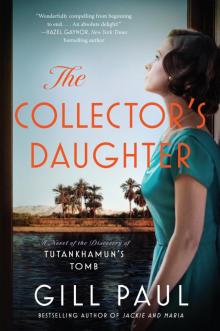 The Collector's Daughter
The Collector's Daughter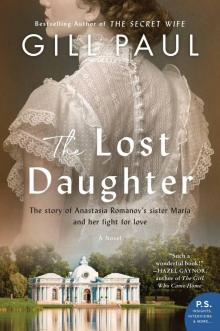 The Lost Daughter
The Lost Daughter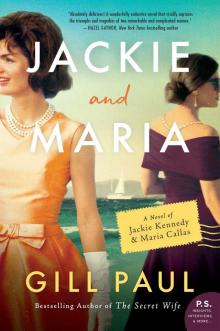 Jackie and Maria
Jackie and Maria The Affair
The Affair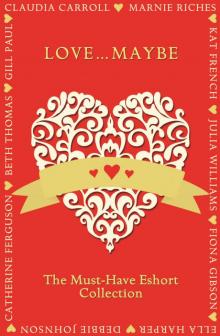 Love...Maybe
Love...Maybe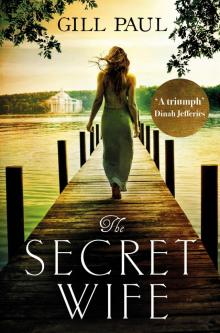 The Secret Wife
The Secret Wife No Place For a Lady
No Place For a Lady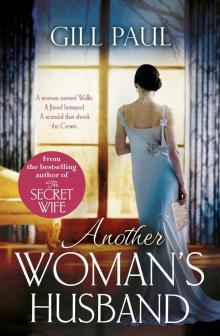 Another Woman’s Husband
Another Woman’s Husband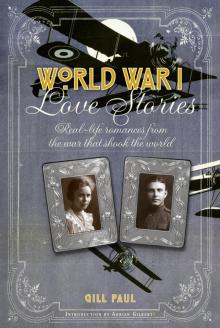 World War I Love Stories
World War I Love Stories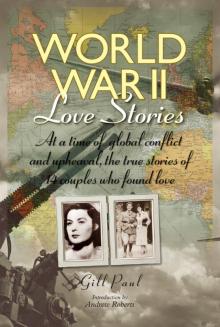 World War II Love Stories
World War II Love Stories